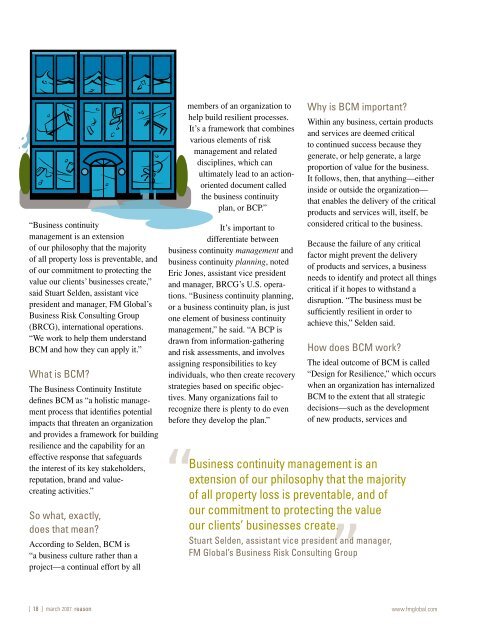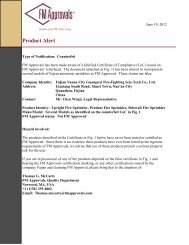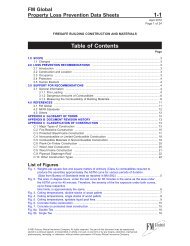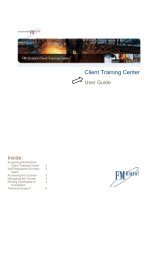Reason March 2007 - P07001 - FM Global
Reason March 2007 - P07001 - FM Global
Reason March 2007 - P07001 - FM Global
Create successful ePaper yourself
Turn your PDF publications into a flip-book with our unique Google optimized e-Paper software.
“Business continuity<br />
management is an extension<br />
of our philosophy that the majority<br />
of all property loss is preventable, and<br />
of our commitment to protecting the<br />
value our clients’ businesses create,”<br />
said Stuart Selden, assistant vice<br />
president and manager, <strong>FM</strong> <strong>Global</strong>’s<br />
Business Risk Consulting Group<br />
(BRCG), international operations.<br />
“We work to help them understand<br />
BCM and how they can apply it.”<br />
What is BCM?<br />
The Business Continuity Institute<br />
defines BCM as “a holistic management<br />
process that identifies potential<br />
impacts that threaten an organization<br />
and provides a framework for building<br />
resilience and the capability for an<br />
effective response that safeguards<br />
the interest of its key stakeholders,<br />
reputation, brand and value-<br />
creating activities.”<br />
So what, exactly,<br />
does that mean?<br />
According to Selden, BCM is<br />
“a business culture rather than a<br />
project—a continual effort by all<br />
[ 18 ] march <strong>2007</strong> reason<br />
members of an organization to<br />
help build resilient processes.<br />
It’s a framework that combines<br />
various elements of risk<br />
management and related<br />
disciplines, which can<br />
ultimately lead to an actionoriented<br />
document called<br />
the business continuity<br />
plan, or BCP.”<br />
It’s important to<br />
differentiate between<br />
business continuity management and<br />
business continuity planning, noted<br />
Eric Jones, assistant vice president<br />
and manager, BRCG’s U.S. operations.<br />
“Business continuity planning,<br />
or a business continuity plan, is just<br />
one element of business continuity<br />
management,” he said. “A BCP is<br />
drawn from information-gathering<br />
and risk assessments, and involves<br />
assigning responsibilities to key<br />
individuals, who then create recovery<br />
strategies based on specific objectives.<br />
Many organizations fail to<br />
recognize there is plenty to do even<br />
before they develop the plan.”<br />
Why is BCM important?<br />
Within any business, certain products<br />
and services are deemed critical<br />
to continued success because they<br />
generate, or help generate, a large<br />
proportion of value for the business.<br />
It follows, then, that anything—either<br />
inside or outside the organization—<br />
that enables the delivery of the critical<br />
products and services will, itself, be<br />
considered critical to the business.<br />
Because the failure of any critical<br />
factor might prevent the delivery<br />
of products and services, a business<br />
needs to identify and protect all things<br />
critical if it hopes to withstand a<br />
disruption. “The business must be<br />
sufficiently resilient in order to<br />
achieve this,” Selden said.<br />
How does BCM work?<br />
The ideal outcome of BCM is called<br />
“Design for Resilience,” which occurs<br />
when an organization has internalized<br />
BCM to the extent that all strategic<br />
decisions—such as the development<br />
of new products, services and<br />
““<br />
Business continuity management is an<br />
extension of our philosophy that the majority<br />
of all property loss is preventable, and of<br />
our commitment to protecting the value<br />
our clients’ businesses create.<br />
Stuart Selden, assistant vice president and manager,<br />
<strong>FM</strong> <strong>Global</strong>’s Business Risk Consulting Group<br />
www.fmglobal.com
















